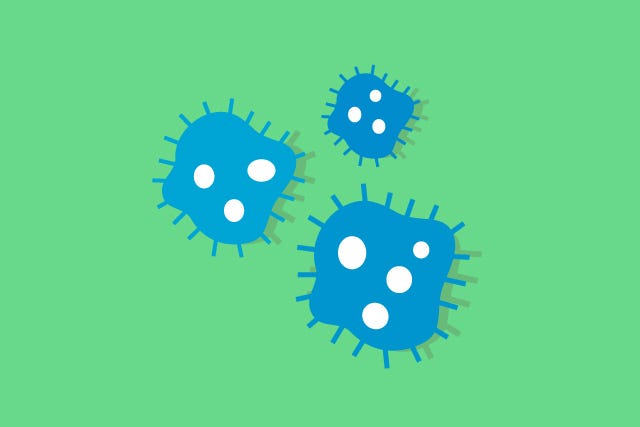Going Out Of Town? Don’t Forget To Feed Your Microbes

Even if you’re globe-trotting solo, you never travel alone. Each time you get on a plane, train, or boat, trillions of little creatures board the vessel with you. They’re the microbes (referred to as "microbiota" by medics) that live on your skin, in your mouth, and in your intestines. They don’t need a ticket to accompany you on your journeys, but they do need your TLC. So, when you're on the go, don't forget to bring your microbes some snacks.
For decades, modern medicine saw microbes as pathogens, but now this view has changed. According to the Human Microbiome Project, there are so many microbes living on and in an average human that their cells outnumber ours, 10 to one. “Our gut is filled with bacteria,” says Brooke Alpert, a nutrition expert and author of two books on healthy living. It may sound gross, but without these little helpers, you wouldn’t last a day. Microbes help you digest your food, they kill pathogens in your intestinal tract, and they even interact with your immune system to keep it alert and active. According to a recent study published in the Journal of Genome Biology by MIT researchers, microbial communities tend to be fairly stable, but traveling can alter them drastically. So can catching a bug. And, as we travel, we’re more vulnerable to pathogens’ attacks.
AdvertisementADVERTISEMENT
“Traveling is stressful on the body,” says Brooke Alpert, a nutrition expert and author of two books on healthy living. Lack of sleep, jet lag, and dehydration — which travelers suffer often because they don’t drink enough water, in an effort to avoid bathroom trips — can put strain on our inner microbial communities. “In most healthy individuals, the good bacteria outweigh the bad, but when something out of the ordinary happens, the bad bacteria start to run amok,” Alpert says. “That’s when we get the diarrhea and constipation associated with traveling; that’s when we get the traveling cold.” Couple this with traveling in developing countries, where drinking water is not as clean nor street food as safe as it is in the Western world, and you’re almost bound to come down with something.
New Jersey pediatrician Sheeba Ben, MD, learned this the hard way when she was visiting family in India. She was careful about what she ate and drank, but once she bought a piece of fruit from a street vendor. The germs that nestled on the spiced piece of green guava wreaked havoc in her stomach ecosystem — even after she came back to the United States. “Two, three weeks after I came back, it really hit: everything from gas to bloating to diarrhea,” Dr. Ben recalls. She was diagnosed with a parasite called giardiasis, and she had to take antibiotics — which is a double-edged sword, experts say. While they destroy pathogens, antibiotics also kill the healthy, beneficial flora in your gut, reducing your overall immune-system response.
AdvertisementADVERTISEMENT

But, as modern medicine now understands, there are better methods of boosting your intestinal (and overall immune) health than with antibiotics. Instead of blindly killing off all flora, there are ways to nurture the good microorganisms so they can protect you from the bad ones. Many foods are natural probiotics, meaning they are full of beneficial gut bacteria. “Yogurts, kombucha, kefir, and fermented vegetables are good probiotics,” says Alpert, who recommends travelers look for these products as they change planes or wait for connecting flights.
But, probiotic-rich foods alone may not be enough when traveling, so Alpert also recommends taking probiotic supplements. One of her favorites is Culturelle, which contains Lactobacillus GG, a strain of Lactobacillus rhamnosus, which is proven to be beneficial in preventing diarrhea and other maladies. Dr. Ben, who was on Culturelle twice a day for a year to get rid of post-infectious irritable bowel syndrome (which commonly occurs after travelers’ diarrhea), seconds Alpert's recommendation. The intestinal issues seem to especially flare in warm weather, Dr. Ben notes. “We see a lot of people coming back from the islands with diarrhea, and also from Southeast Asia or Africa,” she says. “I recommend they start taking probiotics even before the trip, and take them with them — to keep the balance between good and bad bacteria.”
Mark Davis, a naturopathic doctor in Portland, Oregon, recommends Lactobacillus and Bifidobacteria species as well as Saccromices Boulardi, probiotic yeast that's naturally found in beer. “I don't necessarily recommend a particular brand, but I do find that price generally tends to correlate with quality,” Davis says. “I suggest that people take a moderately-priced Lacto-Bifido probiotic (about 10 billion organisms) two to three times per day, and add on Saccromices Boulardi (five billion organisms) two to three times per day.” He also recommends Travelan, a product that guards against E. coli. It’s made in Australia, but can be bought on the Internet.
The way Alpert puts it, “Whatever you take, just take it. It’s better than not taking anything.” So, the next time you hit the road (or skies or sea), make sure to give your tiny travelers some love. Feed them some yogurt, kombucha, and kefir — and keep their numbers high and potent with probiotic supplements. The more you take care of your microbes, the more they'll take care of you.
AdvertisementADVERTISEMENT






